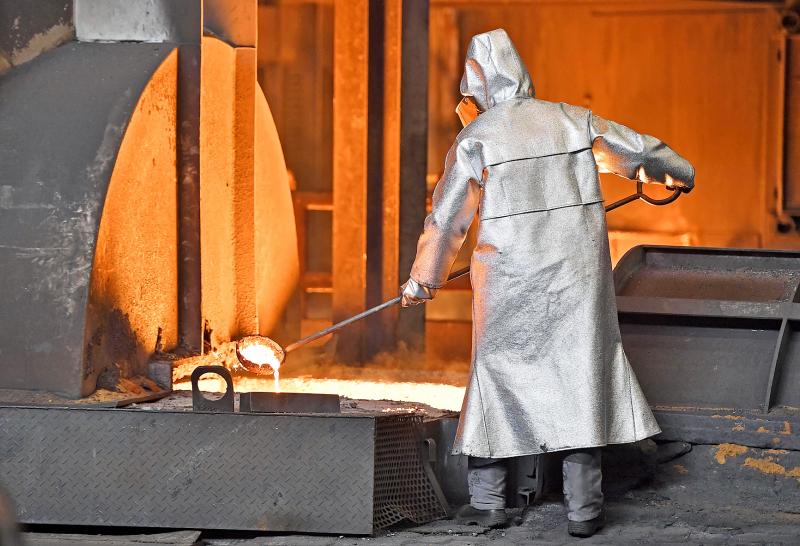Eurozone manufacturing activity expanded at a record pace last month, according to a survey yesterday, which suggested that growth would have been even faster without supply bottlenecks that have led to an unprecedented rise in input costs.
The bloc’s economy has been ravaged by the COVID-19 pandemic over the past year, with governments forcing much of the region’s dominant service industry to close, but factories largely remained open and virus restrictions in various countries have gradually been eased.
IHS Markit’s final manufacturing purchasing managers’ index rose to 63.1 from April’s 62.9, above an initial 62.8 “flash” estimate and the highest reading since the survey began in June 1997.

Photo: AP
An index measuring output, which is seen as a good guide to economic health, eased from April’s 63.2 to 62.2. Anything above 50 indicates growth.
“Surging output growth adds to signs that the economy is rebounding strongly in the second quarter,” IHS Markit chief business economist Chris Williamson said. “However, May also saw record supply delays, which are constraining output growth and leaving firms unable to meet demand to a degree not previously witnessed by the survey.”
Disruptions caused by the global pandemic are still having a huge impact on supply chains, making it a sellers’ market for the raw materials that factories need.
The input prices index soared to 87.1 from April’s 82.2, easily the highest reading on record, and while factories passed on those costs at the fastest pace in the survey’s history, some of the burden was absorbed by manufacturers.
Still, inflationary pressures might be welcomed by policymakers at the European Central Bank, who have not managed to get inflation anywhere near their goal, despite years of ultra-loose monetary policy.
The eurozone was expected to emerge from a double-dip recession this quarter, a Reuters poll found, but a projected rise in price pressures this year was not expected to be sustainable, with inflation forecast to ease substantially.
“We expect price pressures to moderate as the disruptive effects of the pandemic ease further in coming months and global supply chains improve,” Williamson said.

Taiwan Transport and Storage Corp (TTS, 台灣通運倉儲) yesterday unveiled its first electric tractor unit — manufactured by Volvo Trucks — in a ceremony in Taipei, and said the unit would soon be used to transport cement produced by Taiwan Cement Corp (TCC, 台灣水泥). Both TTS and TCC belong to TCC International Holdings Ltd (台泥國際集團). With the electric tractor unit, the Taipei-based cement firm would become the first in Taiwan to use electric vehicles to transport construction materials. TTS chairman Koo Kung-yi (辜公怡), Volvo Trucks vice president of sales and marketing Johan Selven, TCC president Roman Cheng (程耀輝) and Taikoo Motors Group

Among the rows of vibrators, rubber torsos and leather harnesses at a Chinese sex toys exhibition in Shanghai this weekend, the beginnings of an artificial intelligence (AI)-driven shift in the industry quietly pulsed. China manufactures about 70 percent of the world’s sex toys, most of it the “hardware” on display at the fair — whether that be technicolor tentacled dildos or hyper-realistic personalized silicone dolls. Yet smart toys have been rising in popularity for some time. Many major European and US brands already offer tech-enhanced products that can enable long-distance love, monitor well-being and even bring people one step closer to

RECORD-BREAKING: TSMC’s net profit last quarter beat market expectations by expanding 8.9% and it was the best first-quarter profit in the chipmaker’s history Taiwan Semiconductor Manufacturing Co (TSMC, 台積電), which counts Nvidia Corp as a key customer, yesterday said that artificial intelligence (AI) server chip revenue is set to more than double this year from last year amid rising demand. The chipmaker expects the growth momentum to continue in the next five years with an annual compound growth rate of 50 percent, TSMC chief executive officer C.C. Wei (魏哲家) told investors yesterday. By 2028, AI chips’ contribution to revenue would climb to about 20 percent from a percentage in the low teens, Wei said. “Almost all the AI innovators are working with TSMC to address the

Malaysia’s leader yesterday announced plans to build a massive semiconductor design park, aiming to boost the Southeast Asian nation’s role in the global chip industry. A prominent player in the semiconductor industry for decades, Malaysia accounts for an estimated 13 percent of global back-end manufacturing, according to German tech giant Bosch. Now it wants to go beyond production and emerge as a chip design powerhouse too, Malaysian Prime Minister Anwar Ibrahim said. “I am pleased to announce the largest IC (integrated circuit) Design Park in Southeast Asia, that will house world-class anchor tenants and collaborate with global companies such as Arm [Holdings PLC],”